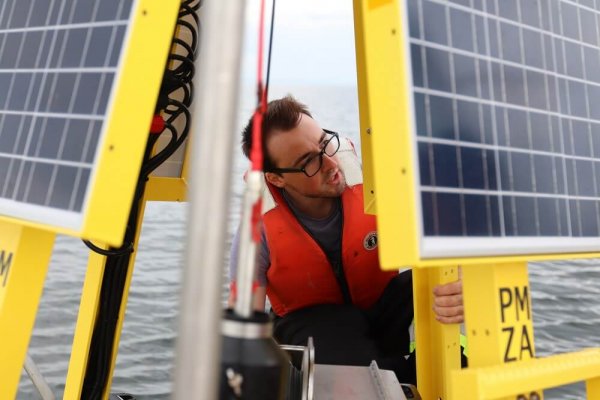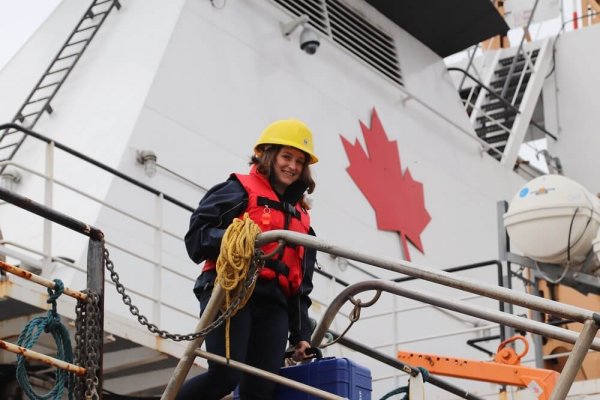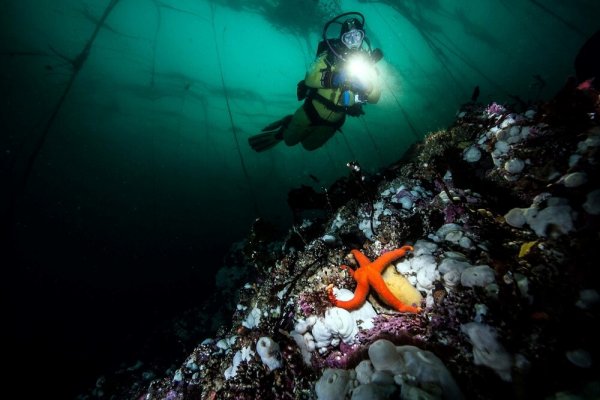
Décennie des Nations Unies pour les sciences océaniques au service du développement durable – Présentée à l’occasion de la séance de discussion ouverte du Congrès de la SCMO 2021
– Par Andi White et Helen Joseph –
Le Congrès 2021 de la SCMO, qui avait pour thème le changement climatique – risque, résilience, réponse, a permis de présenter les efforts déployés dans le cadre de la Décennie des Nations Unies pour les sciences océaniques au service du développement durable (la « Décennie pour les sciences océaniques ») et de discuter du rôle du Canada. La Décennie pour les sciences océaniques (2021-2030) permettra d’obtenir « l’océan dont nous avons besoin pour l’avenir que nous voulons » et offre une occasion unique à toutes les parties prenantes de l’océan d’appliquer la science et les connaissances océaniques essentielles pour inverser le cycle de déclin de la santé des océans et soutenir le développement durable de notre océan. Pour que le Canada soutienne avec succès la Décennie pour les sciences océaniques et atteigne un impact significatif et durable, il faudra une approche coordonnée pour déterminer et exécuter des initiatives océaniques collaboratives qui incluent tous les membres de la communauté océanique. Ensemble, nous devons transformer notre façon actuelle de faire de l’océanographie en créant de nouvelles idées, solutions, partenariats et applications.
HCJ Consulting et Pêches et Océans Canada (MPO) ont organisé une séance de style discussion ouverte sur la Décennie pour les sciences océaniques le 11 juin dans le cadre de la programmation du Congrès de la SCMO 2021. La séance a permis d’informer les participants sur la Décennie pour les sciences océaniques, de présenter une série de conférenciers qui ont mis en lumière des exemples de projets et de programmes scientifiques canadiens collaboratifs en lien avec les ambitions de la Décennie pour les sciences océaniques, et de discuter de la façon dont la communauté océanique canadienne peut générer et partager des données et des connaissances liées aux océans pour faire avancer la Décennie pour les sciences océaniques. En outre, ils ont organisé une séance d’affichage liée au même thème avec une possibilité de discussion.
Andrea (Andi) White (conseillère scientifique principale, MPO) a fourni une présentation générale sur la Décennie pour les sciences océaniques, sa vision, sa mission et ses objectifs (c’est-à-dire les résultats et les défis). Il est particulièrement intéressant de noter que la Décennie pour les sciences océaniques définit l’« océanologie » de façon très large et inclut non seulement les sciences naturelles et physiques, mais aussi les sciences sociales, les connaissances autochtones, les connaissances locales et expérientielles, les politiques, les sciences humaines, etc. Cette inclusion dans toutes les disciplines concorde avec l’intention de la Décennie pour les sciences océaniques d’être transformatrice, innovante et plus inclusive, en adoptant une approche transdisciplinaire pour aborder les problèmes et concevoir des solutions. Andi a souligné qu’afin de faire progresser la Décennie, la communauté océanique canadienne devra travailler en collaboration pour passer à une nouvelle façon de travailler ensemble, en tirant parti et en améliorant les partenariats existants et en en créant de nouveaux au Canada et ailleurs.
UN Decade of Ocean Science for Sustainable Development – Profiled at the 2021 CMOS Congress Town Hall Session
– By Andi White and Helen Joseph –
Overview
The 2021 CMOS Congress, under the theme of Climate Change – Risk, Resilience, Response, provided an opportunity to showcase efforts emerging under the UN Decade of Ocean Science for Sustainable Development (the ‘Ocean Decade’) and discuss Canada’s role. The Ocean Decade (2021-2030) will deliver “the ocean we need for the future we want” and offers a once-in-a-lifetime opportunity for all ocean stakeholders to apply critical ocean science and knowledge to reverse the cycle of decline in ocean health and support the sustainable development of our ocean. For Canada to successfully support the Ocean Decade and achieve meaningful and long-lasting impact will require a coordinated approach to identify and execute collaborative ocean initiatives that are inclusive of all members of the ocean community. Together, we must transform how we currently do ocean science through the creation of new ideas, solutions, partnerships, and applications.
HCJ Consulting and Fisheries and Oceans Canada (DFO) hosted a Town Hall style session about the Ocean Decade on June 11 as part of the 2021 CMOS Congress programming. The session informed participants about the Ocean Decade, featured a suite of speakers who highlighted examples of collaborative Canadian science projects and programs relevant to the Ocean Decade ambitions, and provided an opportunity to discuss how together, the Canadian ocean community can generate and share ocean-related data and knowledge to help advance the Ocean Decade. In addition, they hosted a poster session related to the same theme with an opportunity for discussion.

Andrea (Andi) White (Senior Science Advisor, DFO) gave an overview presentation about the Ocean Decade, its vision, mission, and objectives (i.e. Outcomes and Challenges). Of particular interest was that the Ocean Decade defines ‘ocean science’ quite broadly and includes not only natural and physical sciences but also social sciences, Indigenous knowledge, local and experiential knowledge, policy, humanities, etc. This inclusivity across disciplines aligns with the intention that the Ocean Decade will be transformative, innovative and more inclusive, taking a transdisciplinary approach to addressing issues and designing solutions. Andi highlighted that in order to advance progress under the Decade, the Canadian ocean community will need to work collaboratively to shift to a new way of working together, by leveraging and enhancing existing partnerships and by building new ones within Canada and beyond.
Supporting the Ocean Decade: Canadian Case Studies
A series of five presentations followed this overview of the Ocean Decade, featuring initiatives that are well-positioned to help advance progress towards various aspects of the Ocean Decade. The presenters outlined their experiences in conducting ocean science in Canada in the context of a specific thematic area, with a particular focus on the challenges and opportunities they have encountered with respect to co-designing, co-producing, and co-delivering of ocean science.
Shayla Fitzsimmons (Executive Director, Atlantic Regional Association of the Canadian Integrated Ocean Observing System (CIOOS)), spoke of her work, both regionally and nationally, and how these efforts will advance progress under Ocean Decade Outcome #6, “An Accessible Ocean”. CIOOS is working across the country and across sectors to unite the knowledge, expertise and digital infrastructure of Canada’s ocean observing community. Shayla emphasized the desire of Canadians to work together on ocean data management as the driving force behind CIOOS. However, the biggest challenges to achieving this were described to be siloed data – a “collect and forget” attitude, a lack in the skillsets necessary for ocean data management, the difficulty to know what data exists, and the recognition of the value of any lost data.
Kim Juniper (Chief Scientist, Ocean Networks Canada) highlighted projects that showcase the benefits of collaborating with Indigenous knowledge holders and local experts to foster ocean literacy in Canada – a key pillar of Ocean Decade Outcome #7, “An Inspiring and Engaging Ocean”. Kim stated that Indigenous engagement was well articulated at the 2019 Ocean Obs conference and that those discussions provide a foundation for meaningful engagement and partnerships going forward under the Ocean Decade. He also emphasized the importance of youth engagement through ocean literacy initiatives and that inclusion of, and training opportunities for, early career ocean professionals was critical if we are to make progress towards Ocean Decade outcomes. He also noted that the Ocean Decade mantra of “leave no one behind” must be a guiding principle for our collaborations in ocean science.
Paul Myers (Physical oceanographer, Professor, and Co-Associate Dean Research, University of Alberta; Chair of the Canadian National Committee for the Scientific Committee for Oceanic Research (SCOR)) discussed Canadian ocean modelling efforts and how this work can contribute to progress under Ocean Decade Outcome #4, “A Predicted Ocean”. In his comments, Paul observed that while ocean modelling and prediction work is clearly in support of Outcome #4, these efforts underpin other Ocean Decade Outcomes including “A Safe Ocean”, “A Sustainably Harvested Ocean”, “A Healthy and Resilient Ocean”, among others. He discussed the need for efforts to further engage scientists in the Ocean Decade, including a specific communication strategy and national mechanisms to support coordinated efforts to engage in Decade activities. He described efforts within Canada to build towards an integrated Canadian ocean modelling community that includes an initial framework for the Canadian NEMO Ocean Modeling Forum, as well as establishing a virtual Ocean Modelling Community of Practice. Although Paul acknowledged the importance of science in underpinning policy and decision-making, he emphasized the need for the continued support of ‘big idea’ and exploratory science and fundamental research.

Melissa Anderson (Assistant Professor of Economic Geology, University of Toronto; Co-Chair of Canada’s National Research Vessel Task Team) provided an overview of the National Research Vessel Task Team, whose mission is to improve researcher’s access to ships and infrastructure, and its Modular Ocean Research Infrastructure as examples of effective cooperative ocean research coordination. She also presented some of the challenges and opportunities that arise with large-scale cooperative projects, including how these kinds of efforts may more rapidly advance progress under the Ocean Decade and the reliance on certain types of research that require access to research vessels and a plethora of large-scale infrastructure. Melissa noted the need for collaborative efforts, often at an international level, to help fulfil the domestic need for research vessel time, given that large-scale equipment is expensive and that access to domestic vessels is limited.
Eric Peterson (Co-founder, Tula Foundation; Director, Hakai Institute) indicated that Hakai aims to be a catalyst – drawing together partners from different parts of Canada’s ocean community. Eric spoke about his experience in conducting and coordinating co-designed ocean research and described his idea to convene a cross-border Collaborative Centre for the Cascadia region and the Northeast Pacific Ocean basin. He noted that there are many active collaborations across the region and that Hakai is well-positioned to serve as a connection between these existing programs while seeking out and integrating new initiatives and blending in any new Ocean Decade Actions. He noted that the current proposed Ocean Decade Actions will spawn regional projects as case studies and nodes via coordinated experiments.
Town Hall Discussion
This session also included an interactive dialogue session that discussed considerations for advancing Canadian co-designed research that would support the Ocean Decade. This portion of the event was moderated by Douglas Wallace (Professor, Dalhousie University; Scientific Director of MEOPAR).
The need for access to ocean data emerged as a common theme. Discussants noted that while predictions may underpin many of the Ocean Decade Outcomes, ocean data defines the foundation for these predictions. The discussion noted the need for capable ocean data managers as a skill in which Canada may have a gap and that funding and recruitment efforts could focus on this area.
The need for effective communication was another challenge area that the group identified for the Canadian ocean science community. The discussion emphasized communication in terms of sharing ocean science data and results, as well as sharing ideas and information. In order to build knowledge and capacity, communication must flow on who is doing what work and how individuals can get involved in initiatives.

The discussion prioritized the challenge of access to Canadian research vessel time, noting the lack of available vessel time as a barrier to research programs, particularly for Early Career Scientists who may lack established networks of contacts to explore opportunities. Discussants reiterated that in many cases, Canadian researchers have had, and will continue, to seek international collaborators in order to access research vessels, including for some missions that occur with Canadian waters.
Participants expressed the value of Canadians seeking collaboration beyond the borders of Canada and that the Canadian ocean science community should reflect on where they could make the most impact, particularly through the lens of capacity building and exchange. Noting that the Ocean Decade prioritizes this issue, the group challenged the Canadian community to organize better in order to become more effective in this regard.
The discussion highlighted adequate and available financial support as a perennial issue that has the potential to become more challenging if we are realistically to move to a more co-designed approach to research. In particular, the group noted the need for funding for Early Career Ocean Professionals, especially for those located internationally, not only for research but also for training and other development opportunities.
There was also discussion around the concept that academia should ensure that they undertake science relevant to policy and decision-making. Although many agreed on the importance of producing results that serve this purpose, many strong voices advocated for discovery science as critical to advancing knowledge and innovation, and as the primary role of academic research. In the context of this discussion, participants floated the idea of integrating training for graduate students and postdoctoral fellows to help them consider broader policy objectives when designing research projects, noting that the current setup of the academic ‘reward system’ does not necessarily support this approach.
There was also mention that gender equity issues, including exposure to harassment and bias, remain as very real barriers for women, and non-binary individuals in Canadian ocean science, particularly in certain sectors.
Poster Session
In addition to the Town Hall Session, four poster presentations nested under the Ocean Decade theme at the Congress focused on data management, vessels, and infrastructure; the CMOS Congress program provides further details. The poster session provided authors with the opportunity to present the content of their posters, as well as highlight the linkages to the Ocean Decade. A brief discussion with session participants generated ideas about how data collection and management might evolve over the Ocean Decade, particularly to support medium- to long-term monitoring of marine protected areas. Examples included transitioning from cabled observatories to moveable infrastructure (e.g. onto vessels) and increased participation of vessels of opportunity in data collection initiatives. Discussants mentioned that achieving the Ocean Decade objectives will require increased collaboration and sharing of vessels and infrastructure more broadly.
Next Steps
As the Ocean Decade continues to gain momentum, ongoing opportunities will emerge for engagement, including the upcoming ‘Ocean Decade Laboratories’. Laboratories are globally focused, interactive sessions addressing each of the seven Ocean Decade Outcomes. Check out this link for more information and note the upcoming Laboratories regarding the ‘Predicted Ocean’ and ‘Productive Ocean’ are scheduled for Fall 2021. In addition, you can find more information here via the Intergovernmental Oceanographic Commission and on DFO’s Ocean Decade website. DFO’s Ocean Decade Office invites you to reach out for information and to discuss ways in which you can get involved.
After 32 years in the Government of Canada working on the science-policy interface of ocean science, climate change, Arctic, and international ocean issues, Helen Joseph launched HCJ Consulting in 2014 to provide advisory and management consulting services. To date, Helen’s services have been provided to the Canadian government and academic clients, as well as to international clients. Highlights include work on the External Review of the Sustaining Arctic Observing Networks (SAON), the Canadian Network of Northern Research Operators (CNNRO), and the Canadian Consortium of Ocean Research Universities as a follow-up from the Council of Canadian Academies assessments on ocean science. Helen is a past-Chair of the Canadian Meteorological and Oceanographic Society’s Arctic Special Interest Group.
Andi White is the Manager of International Science Initiatives at Fisheries and Oceans Canada (DFO), where she plays a leadership and coordination role for Canadian engagement in the UN Decade of Ocean Science for Sustainable Development, as well as other international commitments related to ocean science. Through her work at DFO, she champions domestic and international efforts to promote gender equity in ocean science and is keen to inspire youth and early career ocean professionals to become the next generation of leaders. Andi has a Master’s of Science in Environmental Toxicology and Chemistry and nearly 20 years of federal government experience that includes conducting scientific research, providing science advice, and bridging the science-policy interface.
Congrès 2021, Décennie pour les sciences océaniques, Nations Unies, océans, Pêches et Océans Canada